Switzerland national football team
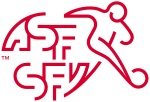 |
|||
| Nickname(s) | Schweizer Nati | ||
|---|---|---|---|
| Association | Swiss Football Association | ||
| Head coach | Ottmar Hitzfeld | ||
| Captain | Alexander Frei | ||
| Most caps | Heinz Hermann (117) | ||
| Top scorer | Alexander Frei (40) | ||
| FIFA code | SUI | ||
| FIFA ranking | 17 | ||
| Highest FIFA ranking | 3 (August 1993) | ||
| Lowest FIFA ranking | 83 (December 1998) | ||
| Elo ranking | 27 | ||
| Highest Elo ranking | 8 (June 1924) | ||
| Lowest Elo ranking | 62 (October 1979) | ||
|
|||
| First international | |||
(Paris, France; 12 February 1905) |
|||
| Biggest win | |||
(Paris, France; 25 May 1924) |
|||
| Biggest defeat | |||
(Budapest, Hungary; 29 October 1911) |
|||
| World Cup | |||
| Appearances | 9 (First in 1934) | ||
| Best result | Quarterfinals, 1934, 1938 and 1954 | ||
| European Championship | |||
| Appearances | 3 (First in 1996) | ||
| Best result | Round 1, 1996, 2004 and 2008 | ||
| Olympic medal record | ||
| Men’s Football | ||
|---|---|---|
| Silver | 1924 Paris | Team |
The Swiss national football team (also known as the Schweizer Nati in German, La Nati in French, Squadra nazionale in Italian) is the national football team of Switzerland. The team is controlled by the Swiss Football Association.
The team's logo, ASF-SFV, represents the Swiss Football Association's initials in Switzerland's official languages: ASF represents both French (Association Suisse de Football) and Italian (Associazione Svizzera di Football), and SFV is German(Schweizerischer Fussballverband).
Its best performances in the World Cup have been reaching the quarter-finals three times, in 1934, 1938 and when the country hosted the event in 1954. Switzerland also won silver at the 1924 Olympics. The youth teams have been more successful, winning the 2002 U-17 European Championship and the 2009 U-17 World Cup.
In 2006, Switzerland set a FIFA World Cup record by being eliminated from the competition despite not conceding a goal, losing to Ukraine in a penalty shootout in the last 16, by failing to score a single penalty – becoming the first national team in Cup history to do this.[1] They would not concede a goal until their second group stage game in the 2010 FIFA World Cup, giving up a goal in the 74th minute against Chile, setting a World Cup Finals record for consecutive minutes without conceding a goal.
Switzerland co-hosted Euro 2008 with Austria, making their third appearance in the competition. As with the two previous appearances, they did not clear the group stages.
Contents |
Recent history
Euro 2004
Qualification: Switzerland qualified for the Euro 2004 in Portugal by finishing first in group 10 of the qualifying, ahead of Russia and Ireland.
Group stage: After a 0–0 draw against Croatia, they lost 0–3 against England and 1–3 against France, and thus ended on the last place in group B of the main tournament.
Trivia: Johann Vonlanthen became the youngest scorer ever in the Euro championships when he equalised against France, beating the record (set only four days earlier by Wayne Rooney) by three months.[2]
World Cup 2006
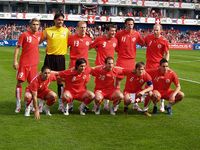
Qualification: The World Cup 2006 in Germany was the first World Cup for Switzerland since their participation at the World Cup 1994. After finishing second behind France in qualifying group 4, they defeated Turkey in the play-off round 2–0 and 4–2 to qualify for the main tournament.
Group stage: In the group stage, they played again against France. The game played in Stuttgart ended in a goalless draw. After defeating Togo 2–0 in Dortmund and South Korea also 2–0 in Hannover, they finished first in group G and qualified for the knockout stage.
Round of 16: In the second round of the tournament, they faced Ukraine in Cologne. The game had to be decided in a penalty shootout since no goal was scored after 120 minutes. Ukraine won the shootout 3–0.
Trivia: Switzerland was the only team in tournament not to have conceded a goal during regulation time in their matches. Switzerland's top scorer at the tournament was Alexander Frei with 2 goals.
Euro 2008
Qualification: Switzerland co-hosted the Euro 2008 together with Austria and was therefore automatically qualified.
Group stage: Switzerland played all matches of group A in Basel. After losing the opening game 0–1 to the Czech Republic and the second game 1–2 against Turkey, they were already eliminated from their home tournament after only two games. Consolation came from the 2–0 victory over Portugal in the final group stage game.
Trivia: All 3 goals by Switzerland were scored by Hakan Yakin.
World Cup 2010
Qualification: Switzerland played in group 2 of the UEFA qualifying for the 2010 World Cup in South Africa. Despite an embarrassing home loss against Luxembourg, they finished first in their group, ahead of Greece, Latvia and Israel.
Group stage: In their first game in group H, the team achieved a 1–0 win against Spain, whom were the eventual competition winners. Switzerland then lost their second game to Chile and thus needed a win by two goals in the last match against Honduras to advance to the next round. However, they managed only a scoreless draw and eventually placed third in their group.
Trivia: The goal by Mark González in the 75th minute of the game against Chile, ended a 559 minute streak without conceding a goal in World Cup matches, beating the record previously held by Italy by 9 minutes.[3]
Euro 2012
Qualification
|
|
Competitive record
So far the Swiss have earned no major trophy. The closest they have come was the quarter finals of the World Cup on three occasions (1934, 1938 and 1954) and they won a silver medal in the 1924 Olympic games in Paris. The youth teams have been more successful, as the U-17-squad became European champions in 2002 and World champions in 2009 and the U-21 squad qualified for the semi-finals of the U-21-Euro 2002.
World Cup recordSwitzerland's record at FIFA World Cups.[4]
|
European Championship record
|
- *Denotes draws include knockout matches decided on penalty kicks.
- Red border color indicates tournament was held on home soil.
Match kits
The Swiss kit consists of two different outfits. The red shirt and white shorts are for home play, and the white shirt and red shorts are for away. The jersey is manufactured by Puma.
Current squad
The following players have been nominated for the games vs. Australia and England . Caps and goals updated on 3 September 2010.
|
|||||||||||||||||||||||||||||||||||||||||||||||||||||||||||||||||||||||||||||||||||||||||||||||||||||||||||||||||||||||||||||||||||||||||||||||||||||||||||||||||||||||||||||||||||||||||||||||||||
Recent call ups
|
||||||||||||||||||||||||||||||||||||||||||||||||||||||||||||||||||||||||||||||||||||||||||||||||||||||||||||||||||||||||||||||||||||||||||||||||||||||||||||||||||||||||||||||
Notes INJ Player withdrew from the squad due to an injury.
Most appearances and goals
Most number of appearances and goals for the Swiss national team. Players in bold are still playing for the national team. Last updated after Switzerland vs. Australia, 3 September 2010.[5]
|
Most appearances
|
Most goals
|
Coaches
 Karl Rappan 1960 to November 11, 1963
Karl Rappan 1960 to November 11, 1963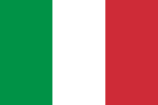 Alfredo Foni – July 1, 1964 to 3 May 1967
Alfredo Foni – July 1, 1964 to 3 May 1967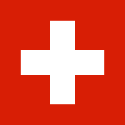 Erwin Ballabio – May 24, 1967 to November 2, 1969
Erwin Ballabio – May 24, 1967 to November 2, 1969 Louis Maurer – October 17, 1970 to October 10, 1971
Louis Maurer – October 17, 1970 to October 10, 1971 René Hussy – June 22, 1973 to September 8, 1976
René Hussy – June 22, 1973 to September 8, 1976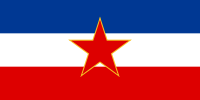 Miroslav Blažević – September 8, 1976 to March 30, 1977
Miroslav Blažević – September 8, 1976 to March 30, 1977 Roger Vonlanthen – March 30, 1977 to March 28, 1979
Roger Vonlanthen – March 30, 1977 to March 28, 1979 Leo Walker – May 5, 1979 to December 21, 1980
Leo Walker – May 5, 1979 to December 21, 1980 Paul Wolfisberg – March 24, 1981 to November 10, 1985
Paul Wolfisberg – March 24, 1981 to November 10, 1985 Daniel Jeandupeux – March 12, 1986 to 26 April 1989
Daniel Jeandupeux – March 12, 1986 to 26 April 1989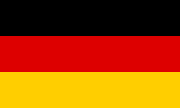 Uli Stielike – June 21, 1989 to November 13, 1991
Uli Stielike – June 21, 1989 to November 13, 1991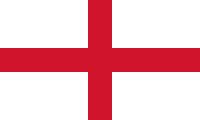 Roy Hodgson – January 26, 1992 to November 15, 1995
Roy Hodgson – January 26, 1992 to November 15, 1995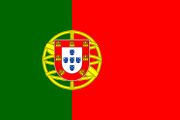 Artur Jorge – March 13, 1996 to June 18, 1996
Artur Jorge – March 13, 1996 to June 18, 1996 Rolf Fringer – August 1, 1996 to October 11, 1997
Rolf Fringer – August 1, 1996 to October 11, 1997 Gilbert Gress – March 25, 1998 to October 9, 1999
Gilbert Gress – March 25, 1998 to October 9, 1999 Enzo Trossero – August 16, 2000 to June 6, 2001
Enzo Trossero – August 16, 2000 to June 6, 2001 Jakob "Köbi" Kuhn – August 15, 2001 – June 30, 2008
Jakob "Köbi" Kuhn – August 15, 2001 – June 30, 2008 Ottmar Hitzfeld – July 1, 2008 –
Ottmar Hitzfeld – July 1, 2008 –
Schedule and recent results
Recent results and future matches.[6] Blue background colour indicates competitive matches.
| Date | Competition | Opponent | Venue | Score | Swiss scorers (International goal) | Ref |
|---|---|---|---|---|---|---|
| 10 October 2009 | WC2010-Q | 3 – 0 | Senderos (4th), Senderos (5th), Huggel (2nd) | [1] | ||
| 14 October 2009 | WC2010-Q | 0 – 0 | [2] | |||
| 14 November 2009 | Friendly | 0 – 1 | [3] | |||
| 3 March 2010 | Friendly | 1 – 3 | Inler (1st) | [4] | ||
| 1 June 2010 | Friendly | 0 – 1 | [5] | |||
| 5 June 2010 | Friendly | 1 – 1 | Inler (2nd) | [6] | ||
| 16 June 2010 | WC2010 | 1 – 0 | Fernandes (2nd) | [7] | ||
| 21 June 2010 | WC2010 | 0 – 1 | [8] | |||
| 25 June 2010 | WC2010 | 0 – 0 | [9] | |||
| 11 August 2010 | Friendly | 1 – 0 | Costanzo (1st) | [10] | ||
| 3 September 2010 | Friendly | 0 – 0 | [11] | |||
| 7 September 2010 | EC2012-Q | |||||
| 8 October 2010 | EC2012-Q | |||||
| 12 October 2010 | EC2012-Q | |||||
| 17 November 2010 | Friendly |
References
- ↑ "Switzerland 0–0 Ukraine (aet)". BBC Sport. 26 June 2006. http://news.bbc.co.uk/sport1/hi/football/world_cup_2006/4991532.stm. Retrieved 2008-06-13.
- ↑ Euro 2008 team preview No1: Switzerland | Football | guardian.co.uk
- ↑ "World Cup 2010: Switzerland Set New Record For Number Of Minutes Without Conceding A Goal". goal.com. 21 June 2010. http://www.goal.com/en/news/1863/world-cup-2010/2010/06/21/1988012/world-cup-2010-switzerland-set-new-record-for-number-of.
- ↑ "FIFA World Cup - Statistics for Switzerland". FIFA.com. http://www.fifa.com/worldfootball/statisticsandrecords/associations/association=sui/worldcup/index.html.
- ↑ "Switzerland – Record International Players". RSSSF. http://www.rsssf.com/miscellaneous/zwit-recintlp.html.
- ↑ "FIFA.com – Switzerland: Fixtures and Results". http://www.fifa.com/associations/association=sui/fixturesresults/gender=m/index.html.
External links
|
|||||||||||||||||
|
|||||||||||||||||||||||||||||
|
|||||
|
|||||||||||||||||||||||
|
|||||||||||||||||
|
|||||||||||||||||||||||
